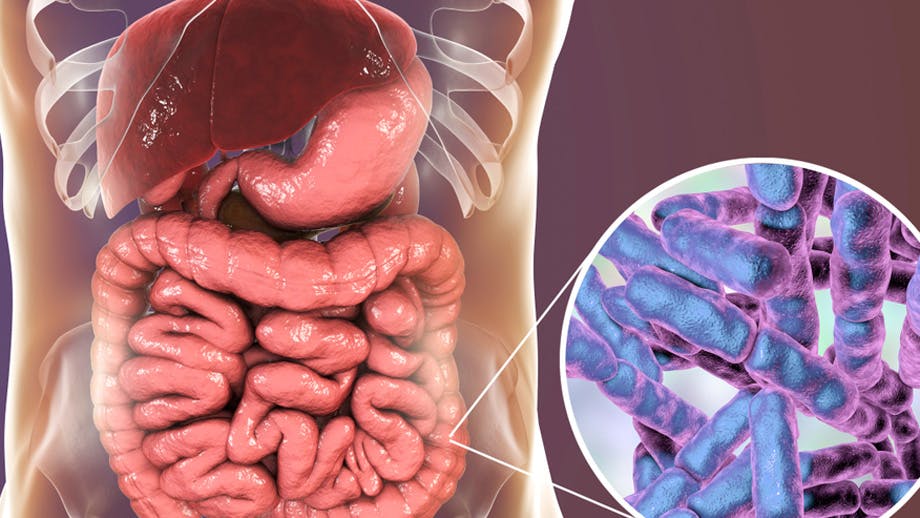The Difference Between Prebiotics and Probiotics
With the recent rise in popularity of both prebiotics and probiotics, chances are you’ve heard about these supplements. But what are they, and why are they important to your gut health? We chatted with a nutritionist to get the scoop on prebiotics vs. probiotics and why you need both.


The Differences Between Prebiotics vs. Probiotics
While prebiotics and probiotics sound similar, they play different roles in your gut health.1 Learn about the differences between the two and how they complement each other with our guest nutritionist.
What Are Prebiotics?
While you’ve heard about them, you might not be all too familiar with prebiotics and their role when it comes to gut and digestive health. “Prebiotics are a type of carbohydrate that is nondigestible, meaning that they are not broken down in the stomach but rather pass through the digestive tract to promote the growth of beneficial bacteria in the intestines,” explains Leslie Bonci, MHP, RD, CSSD, LDN, a nutrition consultant and founder of Active Eating Advice.1,3
Prebiotics can be :1
- whole grains
- bananas
- greens
- onions
- garlic
- soybeans
- artichokes
Prebiotics can also come in powder form. A good example is Benefiber, a clear, taste-free prebiotic fiber that nourishes the good bacteria that exist naturally in your gut. This type of prebiotic powder can be added right into oatmeal, smoothies, or yogurt, explains Bonci. “Prebiotics are the food for probiotics, so we need them; otherwise, the good bacteria in the gut can’t flourish,” she says.1
What Are Probiotics?
Probiotics are foods or supplements that contain live microorganisms intended to maintain or improve the "good" bacteria in the body.1
According to Bonci, probiotics can be found in fermented foods like:2
- yogurt with live, active cultures
- kefir
- sauerkraut
- tempeh
- kombucha
“They are often defined as good or beneficial bacteria because they keep the GI tract healthy,” says Bonci. “Probiotics may play a role in controlling symptoms of IBS, replenishing bacteria destroyed by antibiotics, urinary health and even the treatment of diarrhea, to name a few.”5,6
The Benefits of Probiotics and Prebiotics on Gut Health
Prebiotics play an important role in supporting gut health by stimulating the growth of beneficial bacteria like Bifidobacterium and Lactobacillus.3 They serve as a food source for said bacteria, which can help maintain a healthy balance in your gut microbiome, or the tiny ecosystem in your gut.4
Studies show that prebiotics, particularly those derived from fruits and plants, may improve your digestive health by promoting diversity and activity among your gut bacteria.3 This can help support mineral absorption, immune health and more.3
Probiotics, which are live microorganisms found in fermented foods, support your gut by adding good bacteria to your microbiome.2 They also reduce the number of harmful bacteria in your gut by limiting the space they have to grow.2 Research suggests that a diet rich in fermented foods can increase diversity in the microbiome and help reduce the amount of inflammation in your body.2
Adding Prebiotics and Probiotics into Your Diet
While more research needs to still be done about the relationship between both pre- and probiotics and disease, promoting a healthy microbiome is never a bad thing, and most healthy adults can add pre- and probiotic foods to their diets.1
Show References
- Probiotics and prebiotics: What you should know. Mayo Clinic. https://www.mayoclinic.org/healthy-lifestyle/nutrition-and-healthy-eating/expert-answers/probiotics/faq-20058065. Accessed 8/21/24.
- Probiotics, Prebiotics, and Postbiotics: What Are They and Why Are They Important? Healthful Nutrition. Stanford University. https://longevity.stanford.edu/lifestyle/2024/04/08/probiotics-prebiotics-and-postbiotics-what-are-they-and-why-are-they-important/. Accessed 8/21/24.
- The promotion mechanism of prebiotics for probiotics: A review. Frontiers in Nutrition. https://www.frontiersin.org/journals/nutrition/articles/10.3389/fnut.2022.1000517/full. Accessed 8/21/24.
- Scientific evidence for health effects attributed to the consumption of probiotics and prebiotics: an update for current perspectives and future challenges. Cambridge University Press. https://www.cambridge.org/core/journals/british-journal-of-nutrition/article/scientific-evidence-for-health-effects-attributed-to-the-consumption-of-probiotics-and-prebiotics-an-update-for-current-perspectives-and-future-challenges/77698F90E653569E04FF07E0D616AC1C. Accessed 8/21/24.
- Probiotics & IBS Symptoms: What You Should Know. North Shore Gastroenterology Associates. https://northshoregastro.com/probiotics-ibs-symptoms-what-you-should-know/. Accessed 8/21/24.
- Probiotics for prevention of recurrent urinary tract infections in women: a review of the evidence from microbiological and clinical studies. Drugs Journal. https://pubmed.ncbi.nlm.nih.gov/16827601/. Accessed 8/21/24.


